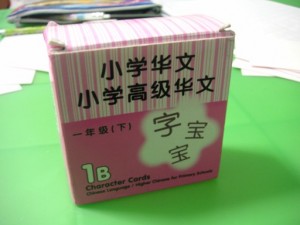Hanyu Pinyin
School-study January 18th, 2011
Hanyu Pinyin WAS a piece of cake to me in the past. After so many years, I find myself turning to Google for Hanyu Pinyin converter and dictionary. *embarrassed*
Then again, learning a skill, or a language, or rather learning anything in life, there must always be one essence present : INTEREST.
Without interest, learning or mastering ‘the thing’ would be swimming against the current.
Hanyu Pinyin is focused only during Primary one and Primary two in schools, in the hope that kids from English speaking backgrounds can pick up Chinese language more easily. Sad to say it backfires as well. With Phonics and Hanyu Pinyin being taught in school, it is undoubtedly that children would get confused with the pronunciation.
For example, ‘UN’ in the English word ‘UNDER’ and ‘UN’ in the Chinese word ‘YUN’ (clouds) have totally different pronunciation. It was a hilarious ride when I started to teach Keatkeat Hanyu Pinyin during Kindergarten 2. Actually, it is quite the same now too. *laugh* I tried my best not to laugh most of the times, ‘cos laughing would make him remember the wrong pronunciation that much more. Simple logic: Laughters creates impressions.
Due to the confusion he had between Chinese Hanyu Pinyin and English Phonics, his interest in learning Hanyu Pinyin went down the hill on roller skates. I tried Hanyu Pinyin Table, but pure memorising simply sucks!
So I worked on building his interest. ‘GAMES’ was the first thing that came to my mind. Let’s face it, kids simply love Games! I tried creating all sorts of Hanyu Pinyin games for him. But what really helped was this:

Before he went to Primary One, my cousin gave me a spare box of zi-bao-bao. Zi-Bao-Bao is used in many Primary Schools to help children recognise newly-learned Chinese words. I turned that box into a card game.

Every week, I would focus on 10 words. After Keatkeat can recognise the 10 Chinese words, I would then turn the card over and write the Hanyu Pinyin behind the Chinese Words with the diao-hao.

So whenever he said the Chinese word correctly, I would ask him to turn the card over and look at the Hanyu Pinyin. After seeing the confidence in him, I would put the Chinese Character facing down. Therefore, just by looking at the Hanyu Pinyin, he could pronounce the Chinese word correctly.
When he said it correctly, he gets to keep the card, otherwise, I would keep it. At the end of the game, whoever that has more cards is the ‘Winner’. *smile*
Every Saturday would become an ‘Add-On’ day. Meaning, I would include the cards that were taught before. Till the whole box of zi-bao-bao is completed.
Do you play games with your child to help him or her improve Hanyu Pinyin too?





January 18th, 2011 at 12:22 pm
Do u have anyidea where to they sell this ?
.-= Suhanya Sundararajan´s last blog ..Want to share Learn WordPresscom =-.
January 18th, 2011 at 12:27 pm
I liked this and I have sent u an email dear reg this n more… do revert back to me
.-= Suhanya Sundararajan´s last blog ..Want to share Learn WordPresscom =-.
January 18th, 2011 at 5:09 pm
nice games.. can consider play with my son while learning han yu pin yin.. :)
.-= prince n princess mum´s last blog ..Vehicles @ Tomatoland =-.
January 18th, 2011 at 6:35 pm
Hi Suhanya,
for the benefit of those who have the same question as you, the box of zi-bao-bao can be purchased from Popular Bookshops or any school bookshops.
January 19th, 2011 at 1:42 pm
GOOD GAME ! Had to google Hanyu..is it the same as normal Pinyin. What online site you use? I also want to learn myself.
January 19th, 2011 at 4:05 pm
My daughter learns both hanyu pinyin and phonics from her kindy. She so far never confuses between these two. I would say her teacher has taught her well. Ha..she is my guru in both areas now.
In order to make her pick up more chinese words, I also use flash card.
.-= Shenny’s Mommy´s last blog ..Drawings 5 =-.
January 20th, 2011 at 11:49 am
Hi Ann,
I did a blog post back in March 2010, you can check out that website. *smile*
http://allaboutyourchild.com/school-study/how-to-teach-hanyu-pinyin
February 4th, 2011 at 10:36 am
well done mummy! you are doing very well in teaching chinese language to your kids!